Unit 3 Listening for Major Details
- 格式:ppt
- 大小:77.50 KB
- 文档页数:23
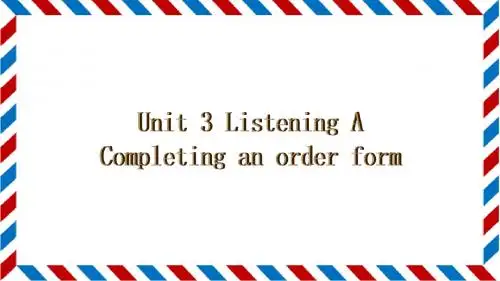
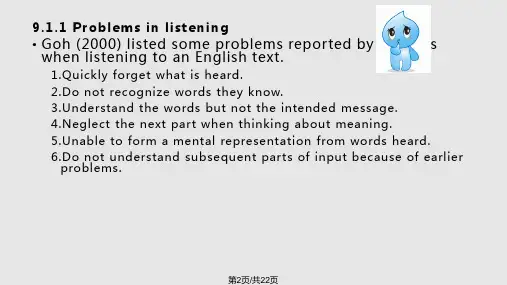
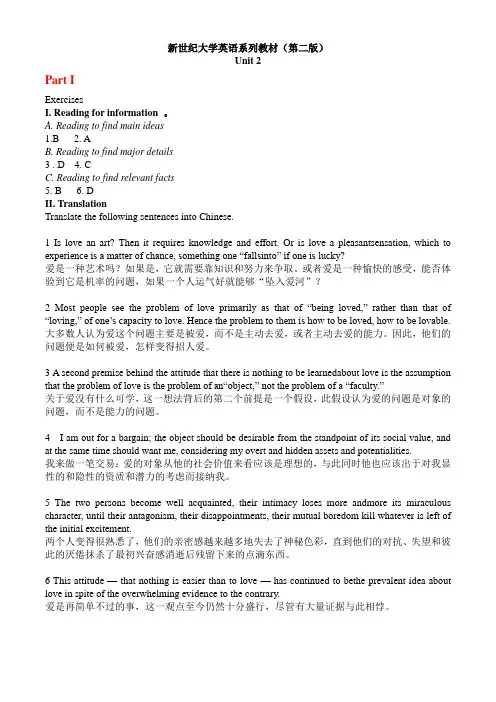
新世纪大学英语系列教材(第二版)Unit 2Part IExercisesI. Reading for information 。
A. Reading to find main ideas1.B2. AB. Reading to find major details3 . D 4. CC. Reading to find relevant facts5. B6. DII. TranslationTranslate the following sentences into Chinese.1 Is love an art? Then it requires knowledge and effort. Or is love a pleasantsensation, which to experience is a matter of chance, something one “fallsinto” if one is lucky?爱是一种艺术吗?如果是,它就需要靠知识和努力来争取。
或者爱是一种愉快的感受,能否体验到它是机率的问题,如果一个人运气好就能够“坠入爱河”?2 Most people see the problem of love primarily as that of “being loved,” rather than that of “loving,” of one’s capacity to love. Hence the problem to them is how to be loved, how to be lovable.大多数人认为爱这个问题主要是被爱,而不是主动去爱,或者主动去爱的能力。
因此,他们的问题便是如何被爱,怎样变得招人爱。
3 A second premise behind the attitude that there is nothing to be learnedabout love is the assumption that the problem of love is the problem of an“object,” not the problem of a “faculty.”关于爱没有什么可学,这一想法背后的第二个前提是一个假设,此假设认为爱的问题是对象的问题,而不是能力的问题。
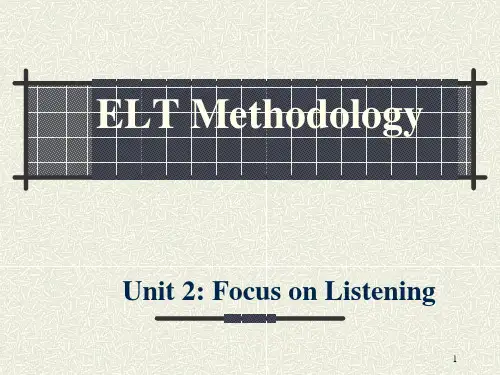
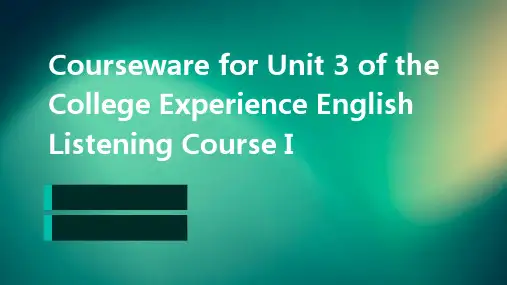


大学英语教学大纲福建农林大学金山学院目录大学英语一级课程 (2)大学英语二级课程 (9)大学英语三级课程 (16)大学英语四级课程 (23)《大学英语》一级课程(College English Band 1)一、简要说明:参照国家教育部制订的《大学英语课程教学要求》, 同时根据我校教学资源、学生入学水平以及所面临的社会需求等实际情况, 特制订本《大学英语教学大纲》,作为我校组织非英语专业本科、专升本学生英语教学的主要依据, 用于指导本校的大学英语教学。
大学英语课程教学包括听、说、读、写四个部分。
二、课程性质、地位和任务:大学英语教学是高等教育的一个有机组成部分,大学英语课程是大学生必修的一门基础课程。
大学英语教学是以英语语言知识与应用技能、学习策略和跨文化交际为主要内容,以外语教学理论为指导,并集多种教学模式和教学手段为一体的教学体系。
大学英语的教学目标是培养学生英语综合应用能力,特别是听说能力,使他们在今后工作和社会交往中能用英语有效地进行口头和书面的信息交流,同时增强其自主学习能力、提高综合文化素养,以适应我国经济发展和国际交流的需要。
三、教学基本要求和方法:(一)教学基本要求1.听力能力要求:能听懂简单的日常会话和课堂用语,能听懂语速为每分钟100词左右的英语短文并理解其中心大意和要点。
2.口语能力要求:在实际交际中做到语音、语调较为自然、得体和流畅;熟悉个人、家庭、日常生活、兴趣爱好、风俗习惯、职业、节日、社交礼仪等方面的话题,并能就这些话题进行简单的会话或陈述。
3.写作能力要求:掌握描述时间、地点、方位的基本表达方式;掌握比较人、物体及事物的基本表达方式;能使用适当的语言形式进行描述和表达观点、态度和情感等;能根据特定目的有效地进行简单的文字表达。
4.阅读能力要求:能读懂语言难度一般的普通题材的文章,领会掌握一些基本的阅读技巧,掌握中心大意及主要事实和有关细节,阅读速度达到每分钟60词。
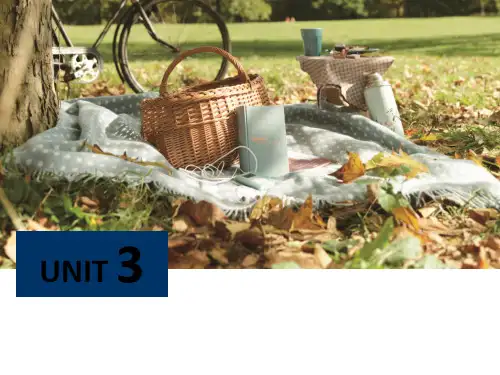
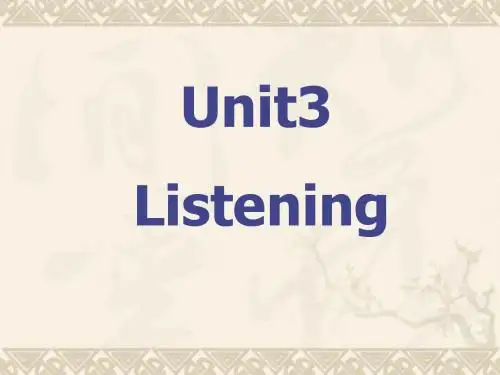
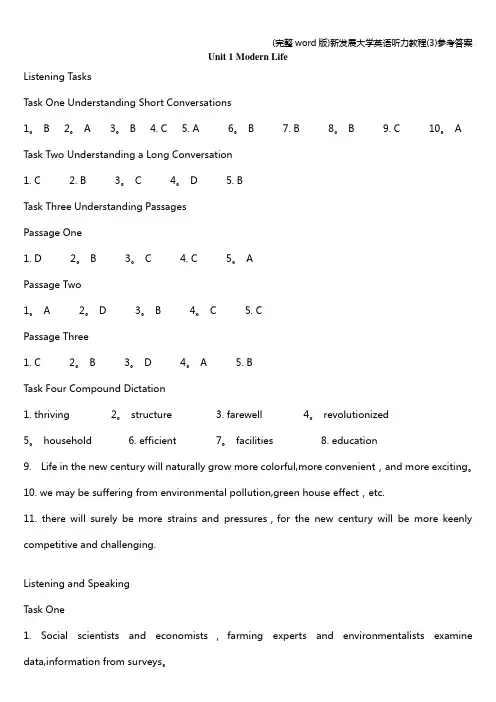
Unit 1 Modern LifeListening TasksTask One Understanding Short Conversations1。
B 2。
A 3。
B 4. C 5. A 6。
B 7. B 8。
B 9. C 10。
A Task Two Understanding a Long Conversation1. C2. B 3。
C 4。
D 5. BTask Three Understanding PassagesPassage One1. D 2。
B 3。
C 4. C 5。
APassage Two1。
A 2。
D 3。
B 4。
C 5. CPassage Three1. C 2。
B 3。
D 4。
A 5. BTask Four Compound Dictation1. thriving 2。
structure 3. farewell 4。
revolutionized5。
household 6. efficient 7。
facilities 8. education9. Life in the new century will naturally grow more colorful,more convenient,and more exciting。
10. we may be suffering from environmental pollution,green house effect,etc.11. there will surely be more strains and pressures,for the new century will be more keenly competitive and challenging.Listening and SpeakingTask One1. Social scientists and economists,farming experts and environmentalists examine data,information from surveys。
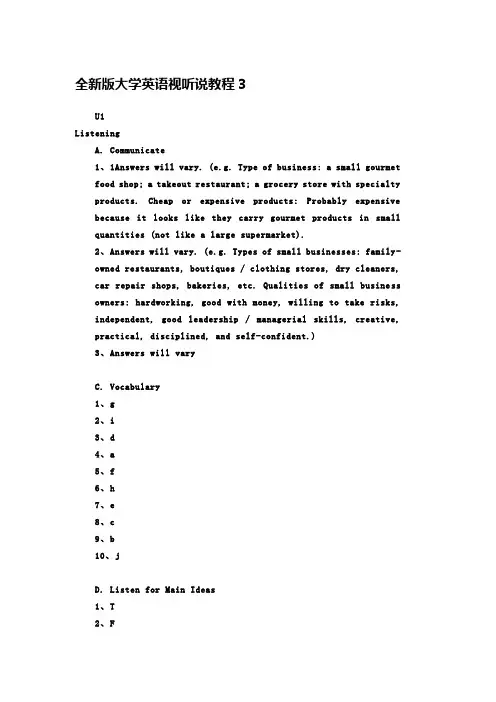
全新版大学英语视听说教程3U1ListeningA. Communicate1、1Answers will vary. (e.g. Type of business: a small gourmetfood shop; a takeout restaurant; a grocery store with specialty products. Cheap or expensive products: Probably expensive because it looks like they carry gourmet products in small quantities (not like a large supermarket).2、Answers will vary. (e.g. Types of small businesses: family-owned restaurants, boutiques / clothing stores, dry cleaners, car repair shops, bakeries, etc. Qualities of small busine ss owners: hardworking, good with money, willing to take risks, independent, good leadership / managerial skills, creative, practical, disciplined, and self-confident.)3、Answers will varyC. Vocabulary1、g2、i3、d4、a5、f6、h7、e8、c9、b10、jD. Listen for Main Ideas1、T2、F3、T4、TE. Listen for DetailsSegment 1:1、Facebook24more than 30 billion dollars2、difficultrapid3、televisioninvestors4、Bill GateSegment 2:1、a caféseven2、free timeSegment 3:1、one third(one) half2、30bankruptcySegment 4:1、marriage / family life2、divorcedchoseExercise F2、Answers will vary. (e.g. There is no guarantee of becoming rich as a business owner.)3、Answers will vary. (e.g. You have to make difficult choicesbetween family and work.)G. Listen and Take NotesExtended ListeningExercise A1、B2、A3、C4、BExercise BExercise C1、A2、B3、D4、BExercise D1、the chefthe wait staff2、brighter than meout of their way3、daring and creativenew ideasExercise E1、C2、B3、C4、BExercise F1、F2、T3、F4、TExercise G1、D2、A3、B4、BExercise H1、$50,000 to $80,000 a month.2、To finish school and become a doctor.3、His company was making $66 million a year.4、Dell is one of the largest computer companies and earnsnearly $80 billion a year.5、He did not have a passion for computers and drive to succeedin business.TEDTalksC. Vocabulary1、C2、B3、A4、B5、A6、B7、A8、A9、C10、AD. Watch for Main Ideas·When you become successful, set an even higher goal for yourself.·Many entrepreneurs fail because they do not take responsibility for their own ·mistakes.·Make sure you take time to celebrate when you are successful.E. Watch for DetailsSegment 1:1、Answers will vary. (e.g. By taking life and educationseriously for 17 years.)Segment 2:2、Answers will vary. (e.g. choices you will have to make)3、Answers will vary. (e.g. make mistakes)4、Answers will vary. (e.g. decision-making)Segment 3:5、Yes6、Answers will vary. (e.g. To work hard for more success.)Segment 4:7、Yours8、Answers will vary. (e.g. Celebrate your achievement.)F. Identify ExamplesG. Expand Your Vocabulary1、B everything is set2、B the market3、C good talent4、C made it5、A turn into6、B for sureSelf-test1—5: BDAAD6–10: BCBDC1—5: ACACC6–10: BBACAU2ListeningA. CommunicateAnswers will vary.C. Vocabulary1、I2、d3、a4、e5、h6、c7、g8、f9、b10、jD. Listen for Main Ideas·Emoji and emoticons help people to communicate better. ·Emoji and emoticons are harming written language.F. Listen for Details43652Exercise GSegment 1:1、Simple pictures.2、Punctuation or other non-letter symbols.3、A combination of two words to make one word.4、Basketball / Sunlight.5、Picture6、CharacterSegment 2:7、Facial expressions and gestures.Segment 3:8、Abbreviations.9、u for you.Exercise H1、Answers will vary. (e.g. we’re losing ablty to commun cmplxideas = step back)2、Answers will vary. (e.g. emoji + emot imprv lng = step frwrd)Extended ListeningExercise A1、C2、B3、C4、DExercise B1、5.2 billion2、diversitythe culture of former speakers3、awarenessendangered languagesgrantslanguage-preservation projects4、record and upload5、hear the wordslearn the languageExercise C1、B2、C3、DExercise D1、T2、F3、F4、T5、FExercise E1、A2、B3、BExercise F1、They enjoy playing with the language and actively invent new vocabulary.2、To express new ideas and objects.3、Because England was once ruled by French-speaking Normans.4、By using prefixes and suffixes.Exercise G1、D2、A3、CExercise H2、invented to describe sounds and the things that make sounds; also invented by repeating a sound with a small change3、invented by reducing phrases4、the shortening of a longer word, often reducing it to one syllable5、combining elements from two wordsExercise ITEDTalksC. Vocabulary1、C2、B3、B4、C5、C6、B7、A8、A9、A10、AD. Watch for Main Ideas·She wants to encourage people to be creative with language.E. Watch for Detailsa、1b、3,5c、4,6F. Watch for Details1、T2、F3、T4、F5、T6、FG. Listen for Explanations Of Words and Terms1、c2、a3、b,d,e4、d,eH. Explain Words and Terms1、boutique2、thunderstorm3、camcorder4、to flanme5、LOLI . Expand Your Vocabulary1、C laws of nature2、B as opposed to3、A Give it a rest4、C makes no sense5、A Go aheadSelf-test1–5: ABBCD6-10:DBCAC1–5:DCDBD6-10: BCCBDU3ListeningA. Communicate1、Answers will vary. (e.g. A dog trained in avalanche rescue is finding survivors.)2、Answers will vary. (e.g. Animals as heroes: some animals, such as the dog in the picture, can be trained to find people after natural disasters.)C. Vocabulary1、h2、j3、c4、b5、d6、g7、e8、a9、f10、ID. Listen for Main Ideas·the history of search and rescue dogs·how technology could make search and rescue dogs more effective·why rats are good at finding landmines·why ravens might make very good rescue animalsE. Listen for DetailsExercise FSegment 1:Answers will vary. (e.g. Who used dogs for search and rescue in the 17th century? How did the dogs help rescue people?)Segment 2:Answers will vary. (e.g. What other skill did the dogs have?)Segment 3:Answers will vary. (e.g. What kind of technology are they using? How is technology making them more effective?)Extended ListeningExercise A1、C2、B3、D4、BExercise B1、It was a magnitude 7.0 earthquake.2、Three million.3、An immediate response to the crisis.4、Crisis mapping.5、Crowd-sourced data.Exercise C1、B2、B3、A4、CExercise D1、gym2、black3、154、1685、high energyfocusExercise E1、B2、B3、C4、BExercise F1、cana force for goodYesIt can2、doesto help many peopleYesa force for goodExercise G1、T2、F3、T4、T5、FExercise H1、B2、B3、C4、AExercise I1、2013small earthquake2、saving many lives3、water, food, and tents4、500 tents1,250 blanketsearthquake survivors5、nearly 1/3healthSpeakingExercise DTEDTalksD. Vocabulary1、B2、A3、B4、A5、B6、C7、A8、B9、A10、AExercise FSegment 1:more than 1M ppl killed / yr2.5M disabled / displacedcommunity takes 20 —30 yrs to recovrSegment 2:reduce 1st respns time by 1 day, reduce recvry time by 1000 days (3 yrs)insur. co. —if homeownrs’claims procssd 1 day earlier, home rebuilt 6 mths fasterG. Watch for Details1、a,b,e,h,k2、a,b,f,h,k3、a,c,g,h,I4、a,d,h,jI. Expand Your Vocabulary1、C pulling toghter2、C wiped out3、A putting at risk4、A game changer5、B the odds6、A sort outSelf-test1–5: BADBD6-10:CCBDB1–5: BCDAB6-10:BCDACU4ListeningA. Communicate1、Answers will vary. (e.g. Temple Grandin’s visual outputarea appears much larger in the brain scan than a typical person’s. This relates to the title because it could make hera better visual learner —learning by seeing images andtechniques.)2、Answers will vary. (e.g. Challenges include making sure thatchildren with autism get an education that will help them to realize their potential. Research on autism is revealing more and more about the potential that people with autism have to contribute to society, but public (and private) services and programs for people with autism are often not up-to-date with the latest research. Thus, families struggle to find the funding and programs that have the most hope of helping their loved ones. Children with autism sometimes have trouble caring for themselves physically, so this is also a challenge for their families. Some people with autism have special visual and spatial abilities, for example an extraordinary ability to recognize patterns in data or visual information; others have extraordinary talent in music or art; still others have extraordinary memories. These are just a few of the abilities that have been found in people with autism.)C. Vocabulary1、B2、A3、C4、B5、C6、C7、B8、C9、A10、AD. Listen for Main Ideas1、N2、T3、F4、F5、T6、FE. Listen for DetailsSegment 1:difficultdifficultydifficulties1、Difficult / Difficulty.2、How Dr. Grandin has faced many difficulties.Segment 2:brainbrainhandlesprocesses1、Brain2、handlesprocesses3、How Dr. Grandin’s brain handles (or processes) information.Extended ListeningExercise A1、C2、A3、B4、C5、DExercise BExercise C1、C2、A3、C4、C5、BExercise D1、eliminatehow you limit yourselfinput2、strengthsweaknesses3、accurateExercise E1、A2、C3、BExercise F1、F2、F3、T4、FExercise G1、C2、D3、A4、BExercise HExercise I1、A person with physical disabilities can still succeed, butit may require more effort and hard work.2、Someone with low social status can still do well, but itmay take more effort and hard work.3、You should master the challenges you face and work hard.SpeakingExercise A1 of cattl wld becm prlyzd + stp moving.contctd Dr. GDr. G saw facil, IDed prblm —hole in roof —lght came in hole coverd, cattl calmExercise E1、[t]2、[d]3、[d]4、[d]5、[t]6、[d]7、[әd]8、[d]9、[әd]10、[t]TEDTalksD. Vocabulary1–5: TFTTT6-10:FTFTFE. Watch for Main Ideas·Everyone has limitations.·Individual limitations can be opportunities to find creative solutions.·Having the complete freedom to do whatever you want to do can be paralyzing.F. Watch for Details5671432Exercise G1、art2、creat3、lim4、destr5、img6、apprJ. Expand Your Vocabulary1、A went nuts2、A came to mind3、B coming up with4、A going through the motions5、B let goSelf-test1–5: DACCB6-10:BDACA1-5: DADBD6-10:CCCBCU5ListeningA. CommunicateAnswers will vary.C. Vocabulary1、b2、g3、I4、c5、d6、h7、j8、e9、f10、aD. Listen for Main Ideas1、C2、B3、A4、B5、BE. Listen for DetailsExtended ListeningExercise A1、B2、B3、C4、CExercise BTo sign up for activities promising stress relief, to learn new techniques to cope with stress, and to find all means and ways to manage their stress.Exercise CExercise D·China’s Ministry of Education is aware of the negative effects of too much academic stress on students and has taken action to reduce it.Exercise E1、B2、BExercise F1、In 2018.2、It assessed the primary and junior high school education sectors in China.3、Advanced preparation.4、The desire to succeed remains fierce among Chinese students and parents.Exercise G2、B3、D4、D5、AExercise HExercise I1、C2、C3、BExercise JExercise KASpeakingA. Communicate1、Answers will vary. (e.g. What causes chronic stress?Psychological fear or worry about the future that lasts a long2、Answers will vary. (e.g. What are the results of too muchstress? Thicker heart muscles and high blood pressure that can lead to heart disease.)3、Answers will vary. (e.g. What are the effects of stress onyour everyday life?)Exercise ETEDTalksC. Vocabulary1、A2、A3、B4、B5、B6、B7、C8、BD. Watch for Main Ideas1、B2、C3、A4、A5、AE. Watch for DetailsSegment 1:↑=>Segment 2:→→→G. Expand Your Vocabulary1、B freaked me out2、C change your mind3、C fine-tunes4、A bottling it up5、A reach out toSelf-test1-5: BBCAB6-10:BACAB1-5: ABBAB6-10:BCDCBU6ListeningA. Think Critically1、Answers will vary. (e.g. Something that is precious isvaluable and important; water, reefs)2、Answers will vary.C. Vocabulary1、b2、j4、c5、e6、I7、f8、h9、a10、gD. Listen for Main Ideas·The preservation of coral reefs is important for both marine and human life.E. Listen for DetailsF. Listen and Take NotesExercise HreefssotooceanhealthStudent:habitatslotsofspeciesTA:canyoulinkdirectlytooceanhealthExercise I1、OK, now let’s talk about what’s happening to the reefs.2、About 20 percent are badly damaged and can’t recover.3、About one half are at risk, but can be saved.Extended ListeningExercise A1、C2、C3、DExercise B1、Nearly 900 dolphins.2、Bleeding and fractures in dolphins’middle ears, and probably decompression sickness (when they rose to the surface too quickly).3、It can cause them to die.4、The ability to identify predators.Exercise C·The Chinese government has taken action to protect the habitat of the endangered Chinese sturgeon.Exercise D1、B2、B3、C4、CExercise E1、In the ocean.2、For about 40 years.3、Water and noise pollution, overfishing, heavy water tra ffic and the reduction of free-flowing water.4、(1)The government designated important ecological areas along the river.(2)The government set up a new River Chief system (where government employees are tasked to manage water pollution and ecological issues).Exercise F1、A2、D3、BExercise G1、70%2、half of the oxygen3、the climatemost of our rainglobal warming and climate change4、natural remedies5、get their income6、more than one billionExercise H1、Increasing human activities; man-made problems.2、We should take positive action.For example,we can limit fishing to reasonable levels and use alternative energy (such as wind and solar power), to ease the problems caused by climate change and pollution.Exercise I1、solutionscleaning up the messoceans2、humans have createdExercise JExercise K1、C2、D3、D4、A5、ASpeakingExercise C1、information question2、yes / no question3、statement questionTEDTalksExercise C1、B2、C3、BE.Vocabulary1、F2、F3、F4、T5、T6、T7、F8、FT9、TF. Watch for Main Ideas·People respect museums and value the things that are in them.·He wants people to respect the oceans as much as they respect museums so that they will protect them from environmental damage.·Museums are a well-respected educational resource.G. Watch for Details1、A2、B3、C4、B5、B6、AH. Expand Your Vocabulary1、A steep learning curve2、C Teaming up with3、A taken up4、A blow my mind5、A plug into6、A the havoc we’re wreakingSelf-test1-5: CABAD6-10:BACAB1-5: DADBC6-10:ADACAU7ListeningA. Communicate1、Answers will vary.2、Answers will vary.C. Vocabulary1、j2、d3、b4、a5、c6、I7、g8、h9、f10、eD. Listen for Main Ideas·We need more research before we can say exactly how the Internet affects reading.·Young people are losing their ability to read because of the Internet.·Young people do not understand why they should memorize information.·Because the Internet has written text as well as pictures and videos, it makes reading easier for some students. ·Young people read differently today than in the past.·By not reading deeply, young people are missing a lot. Exercise EF. Listen for DetailsExercise G1、A2、A3、C4、BExtended ListeningExercise A1、C2、B3、AExercise BDigital education.Exercise C1、subjectage, ability or location2、level the playing fieldcheappoorer studentsaffordable and accessible3、ideasworldrepeatfearassignmentspurchasetextbooks or stationeryExercise D1、B2、C3、DExercise E1、Nearly 2,500.2、Taking shortcuts and not putting effort into their writing.3、They had to look up information in libraries and archives.4、They gave students the lowest scores for these issues.5、Critical thinking and methodical research.Exercise F1、C2、D3、BExercise G1、T2、F3、T4、FExercise H1、A2、B3、DExercise IAn Example of Critical Thinking Exercise:candles and matchesHow does a candle burnProcedure of the exercise:1、litwatched them burn2、theory after theorywhy their candles burned3、why these theories were wrong4、closer to the truthThe answer to the question students had through critical thinking:1、flamewaxvaporrosehot2、fed the flamewax into vaporTEDTalksD. Vocabulary1、A2、C3、A4、C5、C6、A7、B8、A9、B10、BE. Watch for Main IdeasSegment 1:·Mitra believes that because of advances in technology, the education system we have today is outdated and needs to change.Segment 2:·The Hole-in-the-Wall experiments were more successful than Mitra had expected.Segment 3:·Through the Hole-in-the-Wall experiments, Mitra showed that there is a way to level the playing field for all children, rich and poor.Segment 4:·The grannies are very important because they motivate the students to learn.Segment 5:·Mitra’s goal is a new educational system in which teachers start the learning process and then let children self-organize and learn by themselves.E. Watch for DetailsSegment 1:1、credit card debt2、environmental footprint3、happinessSegment 2:1、footprint2、save (you some) money3、more easeSegment 31、edit2、space3、multifunctional spacesF. Watch for Details34167285G. Expand Your Vocabulary1、A sets the stage2、C run the show3、B How on earth4、C haven’t the foggiest idea5、B ahead of their time6、A spare partsSelf-test1-5: CBDBB6-10:ADACB1-5:CDBBA6-10:CABACU8ListeningA. Communicate1、Answers will vary. (e.g. They are remodeling, or fixing up,an old home. They might feel excited, nervous, tired, etc.)2、Answers will vary. (e.g. Some people might like to do DIYprojects because it’s cheaper than hiring someone, it gives them a way to be creative, they can work with their hands, it challenges them, and they enjoy the final product more because of their hard work.)3、Answers will vary. (e.g. For all of the reasons listed in Number 2, and also because they can personalize the things they make.)4、Answers will vary.C. Vocabulary1、C2、C3、B4、A5、A6、B7、B8、C9、B10、BD. Listen for Main Ideas1、Answers will vary. (e.g. Results: most people in Group 1 did nothing. They did not work on the bracelet because there was no real reason to do so; they would just be taking the bracelet apart and putting it back together again in exactly the same way. They probably could not see the point in doing that.)2、Answers will vary. (e.g. Results: most people in Group 2 worked on the bracelet. They did so because they had a reason to do it—to change the bracelet’s design.)3、Answers will vary. (e.g. Results: they put a higher value on their own frogs, because people have a strong tendency to overvalue things that they do or make themselves.)4、Answers will vary. (e.g. Results: they put a hig her valueon the expert-made frogs. They did not make the frogs themselves, so they were able to see that the expert-made frogs were of a higher quality and thus worth more than the ones made by the experiment participants.)E. Listen for Details24317685F. Listen for Details2143Extended ListeningExercise A1、C2、B3、CExercise B1、Answers will vary. (e.g. When Jake becomes a teenager, inabout 7 years.)2、He told his father to paint his room yellow and told hismother blue.3、He felt uncomfortable as he and his wife Susan painted theirson’s room yellow and blue and he thought their son would be disappointed at the mix-up.4、The colors reminded him of his favorite movie characters, the Minions.Exercise C1、C2、A3、B4、DExercise D1、resourcesecosystemsquality2、5003、Airbnb and UberExercise E2135467911810Exercise F1、A2、C3、B4、CExercise G1、Software was no longer free and you couldn’t alter it. Itsoon became expensive.2、To offer the source code of its browser for free.3、They thought “free”software sounded second-rate.Exercise H1、B2、D3、DExercise I1、T2、T3、FTEDTalksExercise AA/B/C/DD. Vocabulary1、a2、h3、I4、b5、c6、j7、f8、e9、d10、gC. Listen for Signals1、B2、C3、AE. Watch for Main Ideas·help people live in a way that does not hurt the environment ·teach people how to achieve high productivity in a small business environment·help people become more self-reliant and less dependent on large industry and corporationsF. Watch for DetailsSegment 1:·Answers will vary. (e.g. Background: farmer, technologist, fr. Poland, now in the U.S.)·Answers will vary. (e.g. Important machines: tractors, bread ovns, circuit mkers)Segment 2:·Answers will vary. (e.g. robust, modular, ↑efficient + optimized, ↓cost, made fr local + recycle matrls—last lifetime, NOT become obsolete)Segment 3:Answers will vary. (e.g. 3D desgns, schematics, instruct videos, budgets)Segment 4:Answers will vary. (e.g. farming, building, manufacturing)Segment 5:Answers will vary. (e.g. Who: developing wrld, Amer farmer,builder, entrepr, maker; What: strt construc bus, parts manufact, orgnc CSA, sell power back to grid)Exercise H1、A2、B3、BI. Expand Your Vocabulary1、A a fraction of the cost2、C was broke3、A showing up4、C unleash5、B supply chainsSelf-test1-5: DCACB6-10:BADBA1-5:ACCDB6-10:DBCBD。
大英3 Unit3 视听说答案II. Basic Listening Practice1. ScriptW: Many Chinese students are too shy to say anything in a classroom.M: I think they don’t speak because their culture values modesty, and they don’t want to appear to be showing off. Goes back to Confucius.Q: Why don’t Chinese students say anything in classroom according to the man?2. ScriptW: The government is doing something at last about sex discrimination in the workplace. Women deserve the same pay as men for the same work.M: Yeah. In the United States, women earn only 70 percent of what men do for the same job. It’s a situation that has to be changed.Q: What does the man say about women?3. ScriptW: I admire Michael Dell. He had a dream to be the world’s largest manufacturer of pe rsonal computers, and he has realized that dream.M: And he dropped out of university to become a success. I wonder if there is a lesson in that. Q: What do we learn about Dell from the conversation?4. ScriptM: Successful entrepreneurs are often self-made people who have a vision and know where they are going.W: But do they enjoy life like you and me, or is money their only concern?Q: What are the two speakers’ attitudes toward successful entrepreneurs?5. ScriptW: Do you agree that equal opportunity for all in an educational system is important?M: Yes, but we have to recognize that all of us are not of equal ability.Q: What does the man imply?Keys: 1.C 2.A 3. D 4.B 5.AIII. Listening InTask 1: Competition in AmericaScriptAlan: What are you reading, Eliza?Eliza: An article on American competition.Alan: Competition is everywhere and constant. Why so much fuss about it, Miss Knowledge? Eliza: Don’t make fun of me. According to the author, competition is especially important in American life. They’re taught to compete from early childhood. When children play games, they learn how to beat others.Alan: And many girls want to look more attractive than the girls sitting next to them in class. Do you think that way?Eliza: Don’t be silly. Let’s get back to the point. When children are growing up, they compete with one another in their studies.Alan: Isn’t that also true of students in othe r nations? As we all know, many Asian students kill for a high test score and grab every opportunity to sharpen their competitive edge over others. Eliza: American boys find great pleasure in competing with each other in sports, according tothe author.Alan: I do like sports. When our football team beats the other team, I feel great. Makes me want to shout out loud. But isn’t that normal throughout the world?Eliza: American people also compete with each other at work and at climbing the social ladder. Alan: But there’s competition in other countries as well.Eliza: You’re right in a sense, but the author says the idea of competing is more deeply rooted in the minds of Americans. They’re even taught that if you lose and don’t feel hurt, there must be something wrong with you.Alan: I hear that some Asians put emphasis on cooperation. Which approach do you think makes more sense?Eliza: It’s hard to say. Anyway, there’s no accounting for different cultures.1. What is the dialog mainly about?2. What is the woman doing?3. What do children learn from playing games according to the woman?4. What does the man say about students’ studies?5. What does the woman say when asked which makes more sense, competition or cooperation?Keys: 1.C 2.A 3.C 4.B 5.DTask 2: Americans’ Work EthicScriptFor four hundred years or more, one thing has been a characteristic of Americans. It is called their “work ethic”. Its (S1) roots were in the teaching of the Christian Puritans who first settled in (S2) what is now the northeastern state of Massachusetts. They believed that it was their (S3) moral duty to work at every task to please God by their(S4) diligence, honesty, attention to details, skill, and attitude. To these Puritans, it was a (S5) sin to be lazy or to do less than your best in any task. They and later Americans tried to follow the Bible’s (S6) teachings, “If a man will not work, he shall not eat.”Therefore, Americans have for (S7) centuries believed that they were guilty of sin if they did not work as carefully and hard as they could when they did anything. God would punish those who were careless or lazy in their work. (S8) Even as children they were taught, “If it’s worth doing at all, it’s worth doing well.”But some people have gone beyond the usual sense of diligence. They are especially attracted to the notion of “climbing the ladder” so as to increase their status, financial position, and sense of self-worth. (S9) In English a new word has been created to describe people who work comp ulsivelly. The word “workaholic” describes an individual who is as addicted to work as an alcoholic is to alcohol.There are conflicting points of view about workaholics. Those concerned with problems of mental stress believe workaholics abuse themselves physically and mentally. (S10) Others hold that workaholics are valuable members of society because they are extremely productive. The American culture values achievement, efficiency, and production, and a workaholic upholds these values.Task 3: Do you kn ow what “Freeze!” means?ScriptThere is one word which you must learn before you visit the U.S.A. That is “Freeze!” It means, “Stand still and don’t move.” Police officers use it when they are ready to use their guns. If the person does not obey the command and moves, they shoot.One evening in Los Angeles, someone rang the bell doorbell of a house. It was a dangerous area at night, so the owner of the house took his gun with him when he answered the door. He opened the door and saw a person, who turned round and started walking away from the house. The owner cried “Freeze!”, but the man went on walking. The owner thought he tried to escape, so he shot him dead.Later, a sad story was uncovered. The dead man was Yoshiro Hattori, a 16-year-old Japanese exchange student. He went to visit a friend for a Halloween party, but he could not remember the number of the house. When he realized that he had gone to the wrong house, he turned round to leave. He did not know much English and so did not understand the command “Freeze!”.The tragedy arose from cultural misunderstanding. Those who have lived in the United States for a long time understand the possibility of being shot when one trespasses upon an individual’s property. It is a well-known fact in America that a person’s home is his castle. Although Rodney Pears, the owner of the house, gave a verbal warning “Freeze!” to Hattori, Hattori did not know it meant “Stand still and don’t move”, and therefore did not obey it. This misunderstanding became the trigger of Hattori’s disaster. The conc ept of owning guns is hard for Japanese people to understand, but in America you are permitted to own a gun under the U.S. Constitution.1.What does the word “Freeze!” mean in the passage?2.What did the owner of the house take with him when he answered the door?3. Why did the Japanese student turn around and leave?4. What is mentioned as a possible result of trespassing?5. Why is the phrase “a person’s home is his castle” quoted in the passage?Keys: 1.C 2.A 3.D 4.B 5.CV. Let’s TalkScriptCulture shock happens to most people who travel abroad. Psychologists tell us that there are five distinct phases of culture shock.During the first few days of a person’s stay in a new country, everything usually goes fairly smoothly. The newcomer is excited about being in a new place where there are new sights and sounds, new smells and tastes. They may find themselves staying in hotels or with a home-stay family that is excited to meet the foreign stranger. This first stage of culture shock is called the “honeymoon phase”.Unfortunately, this phase often comes to an end fairly soon. The newcomer may encounter many problems in transportation, shopping, or interpersonal communication. You may feel that people no longer care about your problems. You might ev en start to think that the people in the host country don’t like foreigners. This may lead to the second stage of culture shock, known as the “rejection phase”. The newcomer may start to complain about and reject the host culture.If you don’t survive stag e two successfully, you may find yourself moving into stage three: the “regression phase”. The word “regression” means moving backward, and in this phase of culture shock, you spend much of your time speaking your own language, watching videos from your home country, and eating food form home. Also, you may remember only the good things about your home country.If you survive the third stage successfully, you will move into the fourth stage of culture shock called the “recovery phase”. In this stage you become more comfortable with the customs of the host country. You start to realize that no country is that much better than another---they are just different.Much later, when you return to your homeland, you may find yourself entering the fifth phase of culture shock---the “reverse culture shock”. After you have become comfortable with the habits and customs of a new lifestyle, you may find that you are no longer completely comfortable in your home country. It may take a little while to become at ease with your home culture.If you overcome the problems in all five phases, you will be much stronger, and you will be a citizen of the world.Task 1: PunctualityScriptTo Americans, punctuality is a way of showing respect for other people’s time. Being more than 10 minutes late to an appointment usually calls for an apology, and maybe an explanation. People who are running late often call ahead to let others know of the delay. Of course, the less formal the situation, the less important it is to be exactly on tome. At informal get-togethers, for example, people often arrive as much as 30 minutes past the appointed time. But they usually don’t try that at work.American lifestyles show how much people respect the time of others. When people plan an event, they often set the time days or weeks in advance. Once the time is fixed, it takes almost an emergency to chance it. If people want to come to your house for a friendly visit, they will usually call first to make sure it is convenient. Only very close friends will just “drop in” unannounced. Also, people hesitate to call others late at night for fear they might be in bed. The time may vary, but most folks think twice about calling after 10:00 p.m.To outsiders, Americans seem tied to the clock. People in some Eastern cultures value relationships more than schedules. In these societies, people don’t try to control time, but to experience it. Many Eastern cultures, for example, view time as a cycle. The rhythm of nature---from the passing of seasons to the monthly cycle of the moon---shapes their view of events. If they have wasted some time or let an opportunity pass by, they are not very worried, knowing that more time and opportunities will come in the next cycle. But Americans often want to jump at the first opportunity. They are unwilling to stand by idly and give up the opportunity. The early American hero Benjamin Franklin expressed that view of time like this: “Do yo u love life? Then do now waste time, for that is the stuff life is made of.”1. According to the passage, when people are late in America, what do they do?2. According to the passage, what do Americans do after the time for an appointment is fixed?3. How do people in some Eastern countries view relationships and schedules?4. According to the passage, why aren’t some Eastern people worried if they let an opportunity pass by?5. What was Benjamin Franklin’s view of time?Keys: 1.C 2.B 3.A 4.C 5.DTask 2: Our Personal SpacesScriptOur personal space, that piece of the universe we occupy and call our own, is contained within an invisible boundary surrounding our body. As the owners of this area, we usually decide who may enter and who may not. When our space is invaded, we react in a variety of ways. We back up and retreat, stand our ground as our hands become moist from nervousness, or sometimes even react violently. Our response shows not only our unique personality, but also our cultural background.For example, cultures that stress individualism such as England, the United States, Germany, and Australia generally demand more space than collective cultures do, and tend to become aggressive when their space is invaded. This idea of space is quite different from the one found inthe Mexican and Arab cultures. In Mexico, the physical distance between people when engaged in conversation is closer than what is usual north of the border. And for middle easterner, typical Arab conversations are at close range. Closeness cannot be avoided.As is the case with most of our behavior, our use of space is directly linked to the value system of our culture. In some Asian cultures, for example, employees do not stand near their bosses; the extended distance demonstrates respect. Extra interpersonal distance is also part of the cultural experience of the people of Scotland and Sweden, for whom it reflects privacy. And in Germany, private space is sacred.Keys: 1.T 2.F 3.T 4.F 5.FTask 3: We don’t know what to do with them.ScriptA Russian, a Cuban, an American businessman, and an American lawyer were passengers on a fast train speeding across the French countryside. As time wore on, the men gradually became friendly with one another, introducing themselves and shaking hands. Eventually, the Russian took out a large bottle of vodka and poured each of his traveling companions a drink. Just as the American businessman was sipping the vodka and praising its fine quality, the Russian hurled the half-full bottle out of the open window.“What did you do that for?” asked the startled American businessman.“Vodka is plentiful in my country,” said the Russian, “In fact, we have thousands and thousands of liters of it---far more than we need.”The American businessman shook his head and leaned back in his seat, obviously baffled by the Russian’s reasoning.A little later, the young Cuban passed around a box of fine Havana cigars. The men enjoyed this treat and made admiring remarks about the pleasures of smoking good Havana cigars. At that very moment the Cuban took a couple of puffs of his cigar and then tossed it out of the open window.“I thought the Cuban economy was not good this year,” the American businessman said. “Yet you threw that perfectly good cigar away. I find your actions quite puzzling.”“Cigars,” the Cuban replied, “are a dime a dozen in Cuba. We have mo re of them than we know what to do with.”The American businessman sat in silence for a moment. Then he got up, grbbed the lawyer, and threw him out of the window。
Unit1VI. Further Listening and SpeakingListeningTask 1: University LifeUniversity life is a new and different experience for me. First of all, living at the university gives me a sense of responsibility, of being on my own. My parents aren’t around to say, “No, you’re not going out tonight.” I decide everything for myself. Being around lots of friendly people is another aspect I like about university life. On my first say, when I arrived on campus, I was a bit confused about where I was going. An upperclassman noticed out I was looking for my dorm, he said, “Oh, just follow me; that’s where I’m going.” Now, I can really say that I feel comfortable in the dorm because there are so many friendly people around to talk with. Finally, I LOVE HA VING Fridays off; I would not be able to deal with five days of classes in a row. How did I do it in high school? I love sleeping in on Fridays. I guess I’m sort of a party animal, but it seems like I go out every Thursday night. It also seems like I don’t get home until early the next day1 My head hits the pillow and I don’t move until Friday afternoon.Task 2: Key to Learning EnglishI think one of the most important keys to learning English id to establish a regular study program, like planning a few minutes every morning around breakfast time. This idea may sound a little too simple to the learners, because they took English in high school for a quite a few years, but they didn’t become proficient speakers of the language. As a matter of fact I do not mean that we can become fluent speakers with just a few minutes here and there, but following a regular and consistent course of study can help us on the way to language mastery. In other words, people need to plan out their study by setting realistic and attainable goals from the beginning. Some people get caught up in the craze of learning the language on 30 days, only to give up when they can’t perform up to their expectations. And small steps little by little, are the key. For example, planning to learn to use them actively—is far better than learning 30 and forgetting them the next day.Task 3: Listening EffectivelyThrough it is 50% of everyday communication, listening, it seems, is the least taught. Listening is more than just hearing: it requires understanding. In an educational setting, listening effectively is critical. Effective listening results in doing the right assignment, doing the assignment correctly, and taking notes effectively. Doing these activities well results in learning and, most of the time, good grades. In a professional setting, listening is also critical. When you receive an oral message, your response must be correct. If you fail to listen to customers or clients, you may lose their business, and your job! Ina personal setting, listening effectively deepens your relationships. When we listen to someone, we say “You are important” without ever speaking a word. When we fail to listen, not only do we not receive the message, but we send the message that we are just plain dumb.Unit2VI. Furthering Listening and SpeakingListeningTask 1: Sports in the U.S.Sports are very important in the U.S. both for spectators and participants. Many people have jobs where they sit for most of the day, so when they have free time, they like to take part in morephysical activities. Both team sports and individual activities are popular. Youth sports are played either in local clubs or for teams representing schools. Most major league sports recruit their players from college or high school teams. Specter sports are also a major part of American culture. Many Americans watch sports weekly, if not daily. Thousands of people attend professional and college sporting events to cheer on their local teams. Millions more choose to watch on TV and root from their own living rooms. On TV, American football, baseball and basketball are the most popular sports. Soccer has a long way to go before it is on the same level with the “big three”. Although there is some overlapping, football is played in the fall, basketball in the winter and baseball in the spring and summer. American professional teams are privately owned and generally situated in major cities, so they have a large fan base to draw from. There’s no government involvement in these leagues.1. popular2. weekly3. local clubs4. big three5. fan baseTask 2: WalkingGenerally, people travel by car, bus or subway in America. Rarely is a bicycle used as a method for transportation. In many cities and towns, Americans choose to walk. Walking is considered one of t he best way to stay healthy. It is the world’s most natural exercise. About 50 million Americans are active in what is called “fitness” walking. They take short walks a few times each week to improve their health. Fitness walking can be done almost anywhere, anytime. No special equipment is needed. Experts advise drinking lots of water before and after each walk. They say the most effective way to walk is the natural way. A new study has provided details about the link between walking and your emotional health. A professional at California State University asked a group of students to describe their feelings of energy and tension. Then he sent them on a fast walk for 10 minutes. When the students returned, they reported feeling less tired and more energetic. The professor found short walks could also help make personal problems seem less serious. Indeed, one group of people said their problems didn’t seem as bad as they had been before they went for a fast 10-minute walk.1. F2.F3.F4.T5.TTask 3: The 27th Summer Olympic GamesThe 27th summer Olympic Games were held in Sydney, Australia, in 2000. Thousand of athletes gathered there to take part in the first Summer Olympic of the new century. It was, however, not the first time for Australia to host the Olympic Games. Australia also played host in 1956, when the city of Melbourne was the site of the Games. The 2000 Olympic lasted a little more than two weeks, from September 15 to October 1. The mascot of Sydney Olympic Games was, not surprisingly, a Kangaroo. There were some new events in the 1000 Olympic, such as women’s water polo and weightlifting. The Games were a great success. In sporting competition, athletes broke lots of Olympic and world records. Also, the event was a huge financial success for Australia, especially in the tourism industry.1. D2.B3.B4.C5.Dunit3VI. Furthering Listening and SpeakingTask 1: Worry of a TeacherSusan Smith cared for her students very much, and they all liked her. She wanted them to learn and to be happy. She had a special relationship with one student, Doris. Doris had been to Susan’s house several times and had come to know her husband and children. Lately, Susan had been very worried about Doris because the student’s hometown had recently been hi t by a strong earthquake. Susan observed that Doris had lost a lot of weight and often had dark circles under her eyes. She talked to Doris and was as helpful as she could be, but felt that Doris really should see a doctor. One day, Susan talked to Doris and suggested that she go to the health center to talk to one of the doctors. Doris’ face became very red. She said, “I don’t need a doctor. How could you make a suggestion like that? I thought you were my friend!” Susan was very surprised by Doris’ reactio n. She said, “I’m sorry to have upset you. I just want to help.” After that conversation, Doris stopped talking to Susan. She also transferred out of her class.1. learn happy2. earthquake3. weight dark circles4. the health center turned red5. surprised talking transferredTask 2: How to build lifelong friendship?You may have a lot of friends and expect your friendships to last a lifetime. However, lifelong friendships are not always what everybody can get. Friends sometimes misunderstand each other. For one thing, you may want your friends to be near at hand, but also you need your independence and privacy. For example, when one of your friends comes asking if it is all right to spend the evening in your house, sometimes you just say “no” t o hi or her because it is nor convenient for you. Unfortunately, not all your friends understand this type of independence. They believe that friends can ask for any favor and the answer should always be “yes”. Also, misunderstanding sometimes occurs when you ask for help. You expect your friends to help you mo matter what the circumstances are. But the fact is, your friends may not always drop everything to satisfy each of your needs. This may make you angry with them and your friendship could fade. The most important thing for you and your friends to do is to always show understanding and respect for each other.unit4VI. Furthering Listening and SpeakingTask 1: Dust StormsAmerican researchers say dust clouds from dry African deserts may be a threat to human health in the United States. The dust may contain many small organisms that could be dangerous. Each year, huge storms form in the Sahara desert of northern Africa. Winds carry the dust across the Atlantic Ocean. The movement of dust has been increasing in recent years because of longer periods settles in South America. From June to October, the winds change and transport the dust to North America, Central America and the Caribbean. More than half of the dust that reaches the United States settles in the sate of Florida. For many years, it has caused the skies there to turn red. There is probably a link between the dust storms and higher rates of allergies and breathing problems in people in this area.1. human health dust clouds2. the Sahara Atlantic Ocean South America3. October Central America the Caribbean4. the United States Florida the skies5. dust storms allergies breathing problemsTask 2: Mental Energy and SeasonYou may not believe that our mental energy varies from season to season. But some people think that it does. Research has shown that climate and temperature have a definite effect on our mental abilities. Scientists have discovered that cool weather is much more favorable for creative thinking than is summer heat. Spring spears to be the best period of the year for thinking. People seem to be a lot sharper in spring than they are in any other season. One reason may be that in spring people’s mental abilities are affected by the same factors t hat bring about great changes in nature. Fall is the next-best season, then sinter. Summer seems to be the best time to take a long vacation from thinking. This does not mean that all people are less intelligent in summer than they are during the rest of the year. It does mean, however, that the mental abilities of most people tend to be lowest in summer. Be aware of these facts, and you will bring your talent into full play.unit5VI. Furthering Listening and SpeakingTask 1: Foods in the WorldFood is national and international. Many people like their own national dishes and a variety of foreign ones. You can find European and Oriental restaurants on most large cities. You can find Italian, French, Chinese, and Mexican restaurants in New York, Washington, San Francisco, and many other cities in the United States. As well, you might also find Greek and Middle Eastern restaurants in some cities in the US. American hamburgers and hot dogs are popular in Tokyo and Paris. In almost every country you will find rice, potatoes, eggs, bread, soup, meat, vegetables, milk, fruit, and other basic foods. People all over cook them differently in different countries. People all over the world also prefer different things to drink. The English drink a lot of tea, and the French a lot of wine. Americans prefer coffee, milk or pop. German beer is now completely international. Children are often very conservative about new foods. In the United States they often prefer to eat the same three or four favorite dishes: hamburgers and French fires, hot dogs, fried chicken, and ice cream.1. national international2. national dishes foreign ones.3. hamburgers hotdogs Paris4. tea coffee milk pop5. children three or four hamburgers fried chickenTask 2: GM FoodsThe term GM foods refers to those produced with the latest genetic engineering techniques. In 2000, countries that grew 99% of the global GM crops were the United States, Argentina, Canada, and China. The next decade will see rapid development in Gm products. Gm foods may solve many of the world’s hunger problems, and help protect environment. Yet there are many challenges ahead for governments, especially in the areas of human and environmental safety, labeling and consumer choice, ethics, food security, regulation and international policy. Many people feel that genetic engineering is inevitable and that such a technology should be put to use.However, others warn that we must take care to avoid causing unintentional harm to both human health and the environment as a result of our enthusiasm for this powerful technology.1. F2.F3.T4.F5.FUnit6VI. Furthering Listening and SpeakingTask 1: Medical Services on CampusWhile every university in America has its own policies and creates its own rules, most provide some type of medical service or health insurance for students, especially large universities. If students have a cold, or other illnesses, they can see a doctor, and they may also seek medical advice on a range of issues. Free testing for STDs such as HIV is a major part of disease prevention—sharing important information about the epidemic. If students need a major operation or procedure, they must seek outside assistance, but the school may help them make the arrangements. Smaller universities and colleges are not likely to provide in-depth medical assistance; they usually deal with small problems in housing, and assist students to take care of major issues off campus. No medical services are offered in universities and colleges that do not have students living on campus.1. medical service health insurance2. medical advice3. operation outside make the arrangements4. medical assistance housing off campus5. living on campusTask 2: An Expensive TreatmentSteven had a temperature of 100. His head was stuffed; his bones ached and his throat was sore. He knew he had the flu. All his roommates had been sick with it. He had used up all the special creams and herbs that his mother had carefully packed and put in his s uitcase, saying, “Just in case you get sick.” After three days of lying in bed, feeling miserable, Steven decided to go to the doctor. He described all his symptoms and was sure the doctor would give him a shot that would make him feel much better. Instead, the doctor told him to get plenty of rest and to drink lots of liquids. She gave him a prescription to fill and said in two or three days he would be feeling better. Ashe left, the receptionist told him his visit would cost $50. Steven paid the money in cash and left the doctor’s office feeling very angry1. F2.T3.F4.F5.TTask 3: Doctor’s AdviceOnce an old gentleman went to see a doctor. The doctor examined him and said, “Medicine won’t help you.” You must have a complete rest. Go to a quiet country place for a month, go to bed early, drink milk, walk a lot, and smoke just one cigar a day.”“Thank you very much,” said the old gentleman, “I shall do everything you say.”A month later, the gentleman came to the doctor again, “How do you do!” said the doctor, “I am very glad to see you. You look much younger.”“Oh, doctor,” said the gentleman, “I feel quite well now. I had a good rest. I went to bed early. I drank a lot of milk. I walked a lot. Your advice certainly helped me. But you told me to smoke one cigar a day, and that one cigar almost killed me at first. It’s no joke to start smoking at j\my age.”1.D 2.B 3.A 4.B 5.Dunit7VI. Furthering Listening and SpeakingTask 1: Does complaining work?Many people tolerate bad service or inferior products rather than make a complaint. They feel that complaining won’t do any good. In fact, they’re wrong: complaining works because companies don’t want dissatisfied customers. If you have a complaint, do something about it right away. The longer you wait, the harder it will be to get your complaint settled. First, you can complain to one of the clerks. If they cannot help you, then ask politely to speak to a manager. Also, many stores have Customer Service representatives whose job is to solve problems in customer relations. These people are eager to assist because companies realize that dissatisfied customers can damage their reputations. You should always insist on your own rights as a customer. You have the right to receive a product you ordered in timely manner and in good condition. With airlines, you have the right to be on the flight you’ve booked. You can also expect a discount if you receive less than you have agreed upon—a hotel room with a view of a brick wall instead of an ocean view, for example.1. tolerate complaint2. do any good dissatisfied customers3. longer harder settled4. Customer Service solve problems5. the right in a timely mannerTask 2: Credit CardsBecause credit cards have so many advantages, their use has become widespread. Unfortunately, however, credit cards are major sources of problems to society as a whole. First, there is the issue of fraud. Stolen credit cards add to the cost of all merchandise as companies write off these losses by adding to the cost of all goods. Second, there are the personal misfortunes. Credit card companies charge exceptionally high rates of interest (about 20%), but because the cards are so easy to use, many people but beyond their ability to repay. Also, there are often too generous limits to the amount of credit one can have; as a result, many people run up such high debts that they go bankrupt. Currently, it is easy for people to own many credit cards. When one credit card is “maxed out” they simply switch to anothe r. Although individual credit cards have limits, the number of credit cards is not limited. People with ten credit cards, each with a $5,000 limit, have $50,000 of credit, even though they might not be able to pay all of their bills. This can easily lead to bankruptcy. Perhaps people should be given an absolute credit limit set as a certain percentages of their imcome.unit8VI. Further Listening and SpeakingListeningTask 1: The Residence HallThe University Residence Hall houses 339 students. It is conveniently located on campus, and provides comfortable, fully air-conditioned room for male and female students. As an integral part of the educational program, it is more than a place where students can eat and sleep; it is a living unit in the true sense of the term. Here students from all parts of the country and all corners of theworld are assigned to room without regard to race, religion, color or national origin. They enjoy many opportunities to make new friends with all kinds of people and can also enjoy many voluntary educational, social, culture and recreational activities provided by the Residence Hall staff, in cooperation with the Residence Hall Council. The experience here will contribute as much to students’ development as will their co ursework and study, and ultimately to the sound education needed for effective citizenship in the community.1. on campus air-conditioned room 3392. the educational program a living unit eat and sleep3. all parts of the country assigned to room national origin4. make new friends educational activities5. students’ development the sound education citizenshipTask 2: Arrangements for MovingGood morning, ladies and gentlemen. I’ve called this meeting to discuss our new campus which is opening fully next year. We plan to move our students to the new facilities in groups, so please listen carefully. They Agricultural Science students won’t move at all. As you know, their new facilities were opened last year, and they are well placed for both laboratory and classroom space. The Arts students, however, are a different case. History students are all moving, but unfortunately Their teachers will be left in the old building, as the new office accommodation isn’t yet ready. Better news for engineers. Your faculty, staff and students, are already in the process of moving to the new campus. The lab is already in operation. The move for the engineers should be completed next week. The old engineering building will be taken over by the Philosophy Department. The Faculty of Law has been moved downtown. This leaves vacant the premises previously occupied by the lawyers. The planning committee is accepting suggestions for the way school buildings could be used. So, if you have further doubts or questions, please let us know. Thank you.1. T2. F3. T4. T5. FTask 3: Top of the WorldSuch a feeling’s coming over meThere is wonder in most everything I seeNot a cloud in the skyGot the sun in my eyesAnd I won’t be surprised if it’s a dreamEverything I want the world to beIs now coming true especially for meAnd the reason is clearIt’s because you are hereYou’re the nearest thing to heaven that I’ve seenI’m on the top of the world lookingDown on creationAnd the only explanation I can findIs the love that I’ve found ever sinceYou’ve been aroundYour love’s put me at the top of world…unit9VI. Furthering Listening and SpeakingListeningTask 1: The Origin of the InternetThe story of the Internet begins in the late 1950s. The Soviet Union launched Sputnik in 1957. The Pentagon set up a research team in 1958 to create a computer network to operate during disasters like a nuclear war. The resulting network linked U.S. scientific and academic researchers. It grew into the World Wide Web or the Internet that became the network system of the Information Age. In1985, the National Science Foundation created a network which provided a free national service to any U.S. research and education institution. Later, large corporations began to build their own networks. All those networks finally joined the Pentagon’s network to form the Internet. By the 1990s, anyone with a computer, a modern, and Internet software could link up to the Internet. In thefuture, the Internet will probably grow more complex and become part of a larger network called theinformation highway. With that people could bank, shop, watch TV, and perform many other activities online.Task2: The Internet—A Small TownThe Internet is a global network, but in many ways it’s like a small town with similar services to offer. There are electronic post offices to send and receive e-mail, functioning somewhat more efficiently than the Post Office we know. There are libraries of information that stay open 24 hours a day with millions of books and documents to browse or search through on the World Wide Web or WWW. You can also enjoy real-time text-based communication, using written or printed material to communicate with others immediately and almost “face to face”. Local coffee shops are seen in the guise of chat room, with people dropping by at all hours of the day and night to socialize. Online education and training is available just as it is in a “bricks and mortar” university or school. Online banking offers you all the services available at your local bank, without fearing to be mugged at an A TM. You can buy almost anything, listen to your local radio station or do your grocery shopping. Indeed, the Internet is your town in a box!Task3: If only life could be like a computer!To get your daily exercise, just click on “run”!If you need a break from life, click on “suspend”.Hit “any key” to continue life when ready.To “add/remove” someone in your life, click settings.To improve your appearance, just adjust the display settings.When you lose your car keys, click on “find”.You could click on “send” and the kids would go to bed immediately.To feel like a person, click on “refresh”.Click on “close” to shut up the noises.To undo a mistake, click on “back”.Is your furniture getting old? Click “update”.If you messed up your life, you could press “Alt, Ctrl, Delete” and start all over!Speaking1. F2. T3.T4.F5.Tunit10VI. Furthering Listening and SpeakingTask 1: Valentine’s D ayValentine’s Day started when the Emperor Claudius II ruled Rome. Claudius punished Rome into so many wars that he had a hard time finding soldiers for his army. He thought the reason was that Roman men did not want to leave their families and lovers. To solve that problem, he cancelled marriages and engagements. But a Christian priest named Valentine who believed in love and marriage secretly married couples When the emperor learned about these marriages, he sent Valentine to prison. The priest died in prison on February 14,270. Not until a few hundred years later did Saint Valentine’s Day take its present form. Today we still honor Saint Valentine. Theold ideas of love, marriage and fertility have lasted and taken on modern meanings.1. wars finding soldiers2. families and lovers3. love and marriage4. prison February 145. fertility modern meaningsTask 2: Holiday bluesWhile for many people the holiday season is joyous and hopeful, others may find it just as stressful as interviewing for a new job. Many factors can contribute to the holiday blues. To begin with, there are more parties to attend and more shopping trips to make. But this doesn’t mean we work fewer hours or get a break from household duties—we just try to do more things in a single day. Then there are the financial burdens. The rewards of being generous to close friends and family may outweigh the price tag—and what about extended family, old friends from school, and co-workers? Don’t they deserve gifts? And finally,the holidays can be truly painful when we recall the loss of those who are no longer celebrating with us because of death, distance or divorce. However, the good news is that it’s usually possible to prevent the holiday blues by diversifying your holiday plans.T F F T TTask 3: Jingle BellsDashing through the snow,In a one-horse open sleigh.Over the fields we go, Laughing all the way.Bells on bobtails ring, Making spirits bright.What fun it is to ride and sing, A sleighing song tonight.Jingle bells, Jingle bells, Jingle all the way.Oh what fun it is to ride,In a one-horse open sleigh.。